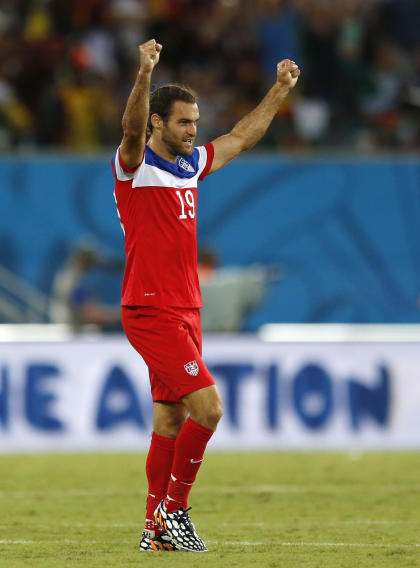U.S.'s World Cup brothers in arms
For complete World Cup 2014 coverage visit Yahoo Sports and follow @YahooSoccer
SAO PAULO – Graham Zusi was fresh off delivering the corner kick that led to the decisive goal in the United States' 2-1 victory over Ghana. It was a signature moment in the 27-year-old's career.
What followed was a euphoric postgame, complete with locker room celebration and a visit from Vice President Joe Biden.

Drained, exhausted and facing a long flight back to Sao Paulo, Zusi showered, changed and headed to the team bus, but not before making sure he slipped a special chain around his neck. Hanging from it was two custom military dog tags.
[Related: Klinsmann refused to let team rest on its laurels after Ghana win]
On the front of both were an American flag and the words "2014 World Cup" and "Stay Fit! Stay Strong! Stay Resilient!"
The back of one featured an engraving with Zusi's soccer information, name, position on the men's national team, hometown, pro team. The back of the other was information from the solider who gave it to him at a ceremony in Jacksonville, Fla., just days before the Americans left for the World Cup. It contained the standard and essential information engraved on all dog tags in case identification is ever needed:
Joseph Edu
Sgt. First Class
U.S. Army
Orlando, Fla.
O Positive
Christian
"Cool guy. Just a really cool guy," Zusi said of Edu. "We're both from Orlando. I'm honored to get to wear this."
He said he wouldn't have wanted to walk out of the stadium any other way than with the tags proudly around his neck for all to see.
The entire U.S. team was given dog tags and many players are wearing them whenever possible here in Brazil, including before and after games as a personal and profound reminder to what it means to represent the country.
No matter the fanfare and glory that comes from winning soccer games, everyone understands who makes the greatest impact and sacrifice for the country.
"It was just really cool to get these," Zusi said. "An honor."

The dog tags are part of the Commitment to Service initiative created by Gen. Martin Dempsey, Chairman of the Joint Chief of Staff, who is focused on making a deeper connection between the military and sports leagues and stars.
[Video: USMNT focused on Portugal, not Ronaldo]
One of the core concepts is to level the playing field between the athletes and the soldiers. In the long-term that means dual service projects and volunteer efforts in communities across the country in partnerships with sports leagues ranging from the NFL to the NBA to Major League Soccer.
But it extends further into the realm of self-worth. The military didn't seek out a visit by the players or some free tickets to the game. Instead, it took 23 local soldiers representing all five branches of the armed forces and had them give an iconic symbol of combat, with their own personal information, to one of the team's 23 players.
[Photos: World Cup stars get emotional during national anthems]
It makes this a two-way street and boosting up the men and women of the service. One group isn't better than the other. Everyone is equal, no matter how starstruck some of the soldiers obviously were.
"We're trying to get away from, 'Let's just bring the military and their families in and sit them in a section of the stadium and nothing happens,' " Master Sgt. Terrence L. Hayes of the Office of the Senior Enlisted Advisor to the Chairman said. "We want it to be a partnership, not necessarily the military being on the receiving end.
"We don't want anything from the players," Hayes continued. "We want them to go to Brazil, perform to the best of their abilities and represent the country the best they can. We gave them the gift."
A similar dog tag exchange is planned for both the U.S. men's and women's basketball teams later this summer during ceremonies at West Point and Annapolis, respectively, prior to their departures to the World Championships.
The U.S. Soccer ceremony took place in Jacksonville prior to the Americans' last tune-up game before the World Cup. It was conceptualized and carried out by Marine Sgt. Major Bryan Battaglia, the highest-ranking enlisted service member in the country.
Perhaps the best part of the entire thing, both the military and the athletes say, is how both sides claimed they were the most honored and excited about it. The players were humbled at the gesture and thankful for the soldiers. The military personnel were selected in part because they were passionate soccer fans.
[Related: The unsung heroes of the U.S. win over Ghana]
"This was a huge deal," Hayes said. "They thought it was the coolest thing and the way the players treated them, they just really felt great."
Sports are always a big deal on military bases at home and abroad, as they provide a release and a bit of normalcy, so service members of all ranks would've watched the game anyway. The exchange didn't hurt, though. And all eyes will be glued to the game against Portugal on Sunday.
Hayes said there is even some hope that the tags are making an impact.
"There's been a lot of joking around the Pentagon that based on the win this week, maybe the dog tags motivated them to play harder," he said.
Zusi wouldn't disagree with that.
"It's almost like you are going into battle with someone with you," he said.
More World Cup coverage on Yahoo Sports:



